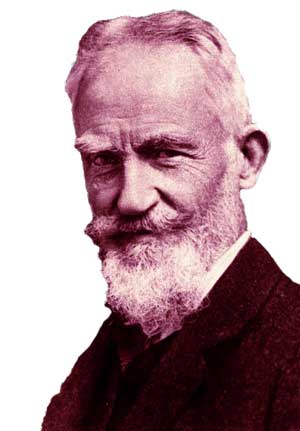George Bernard Shaw-Quotes, Life ,Family
George Bernard Shaw: George Bernard Shaw was an Irish protestant playwright based in the United Kingdom. He was uniquely the winner of the Nobel Prize in Literature and an Academy Award for writing the adapted screenplay.
George Bernard Shaw-Biography-Life HISTORY
George Bernard Shaw: George Bernard Shaw was an Irish protestant playwright based in the United Kingdom. He was uniquely the winner of the Nobel Prize in Literature and an Academy Award for writing the adapted screenplay.
George Bernard Shaw was born in 1856 in Dublin, in a lower-middle-class family of Scottish-Protestant ancestry. His father was a failed corn-merchant, with a drinking problem and a squint, and his mother was a professional singer, the disciple of Vandeleur Lee, a voice teacher claiming to have a unique and original approach to singing.
When Shaw was just short of his sixteenth birthday, his mother left her husband and son and moved with Vandeleur Lee to London, where the two set up a household, along with Shaw’s elder sister, Lucy. There, Shaw’s mother worked as a clerk for an estate office.

In 1876, Shaw left Dublin and his dad and moved to London. He went with his mother’s menage. There he lived with his mother and sister while pursuing a career in journalism and writing.
The first medium he attempted as an inventive author was exposition, finishing five books before any of them were distributed. He read unquenchably, in open libraries and in the British Museum perusing room.
George Bernard Shaw Playwright
In 1891, at the invitation of J.T.Grein, a vendor, theater commentator, and chief of a dynamic private new-play society, The Independent Theater, Shaw composed his first play, Widower’s Houses.
For the following twelve years, he composed near twelve plays, however, he, for the most part, neglected to convince the directors of the London Theaters to create them.
A few were produced abroad; one (Arms and the Man) was produced under the auspices of experimental management; one (Mrs. Warren’s Profession) was censored by the Lord Chamberlain’s Examiner of Plays and several were presented in single performances by private societies.
In 1898, after a genuine ailment, Shaw surrendered as theater faultfinder and moved out of his mom’s home where he was all the while living to wed Charlotte Payne-Townsend, an Irish woman of independent means. Their marriage lasted until Charlotte’s death in 1943.
In 1904, Harley Granville Barker, an actor, director and playwright, twenty years younger than Shaw who had appeared in a private theatre society’s production of Shaw’s Candida, took over the management of the Court Theatre on Sloane Square in Chelsea and set it up as an experimental theatre specializing in new and progressive drama.
Over the following three seasons, Barker delivered ten plays by Shaw, and he started composing new plays in light of Barker’s administration explicitly.
George Bernard Shaw
Throughout the following ten years, everything except one of Shaw’s plays, (Pygmalion in 1914) was created either by Barker or by Barker’s companions and partners in the other exploratory theatre managements around England.
With eminences from his plays, Shaw, who had turned out to be monetarily free on wedding, presently turned out to be very rich.Consistently, he stayed dynamic in the Fabian Society, in regional government, and on advisory groups committed to closure sensational restriction, and to set up a financed National Theater.
The episode of war in 1914 changed Shaw’s life. For Shaw, the war represented the bankruptcy of the capitalist system, the last desperate gasps of the nineteenth-century empires, and a tragic waste of young lives, all under the guise of patriotism. He communicated his assessments in a progression of paper articles under the title, Common Sense About the War.
After the war, Shaw discovered his sensational voice again and remade his notoriety, first with a progression of five plays about “inventive advancement,” Back to Methuselah, and after that, in 1923, with Saint Joan. In 1925, he was granted the Nobel Prize for Literature.
He gave the money grant towards an English version of the Swedish writer, August Strindberg, who had never been perceived with a Nobel prize by the Swedish Academy.
Shaw’s plays were routinely delivered and resuscitated in London. He lived the rest of his life as an international celebrity, traveling the world, continually involved in local and international politics. And he kept on composing a large number of letters and over twelve more plays.
In 1950, Shaw tumbled off a stepping stool while cutting a tree on his property at Ayot St.Lawrence in Hertfordshire, outside London, and died a few days later of complications from the injury, at the age of 94.
He had been grinding away on one more play (Why She Would Not). In his will, he left a huge piece of his bequest to a task to patch up the English letters in order.
From that point forward, the task fizzled, the home was separated among different recipients in his will: the National Gallery of Ireland, the British Museum, and the Royal Academy of Dramatic Art.






